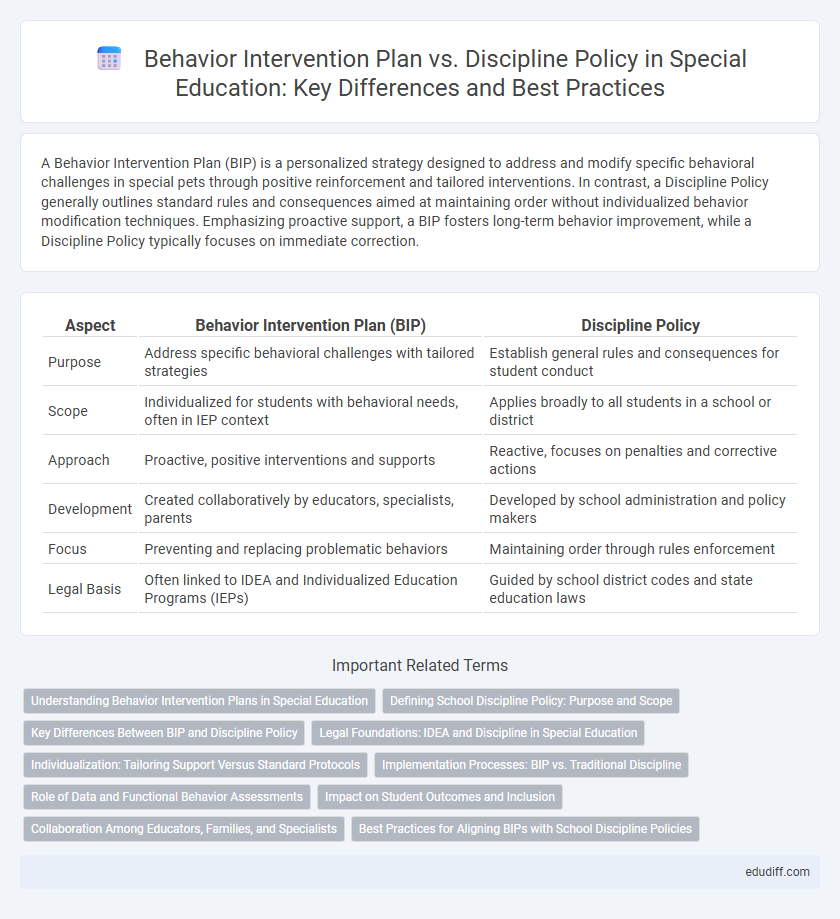A Behavior Intervention Plan (BIP) is a personalized strategy designed to address and modify specific behavioral challenges in special pets through positive reinforcement and tailored interventions. In contrast, a Discipline Policy generally outlines standard rules and consequences aimed at maintaining order without individualized behavior modification techniques. Emphasizing proactive support, a BIP fosters long-term behavior improvement, while a Discipline Policy typically focuses on immediate correction.
Table of Comparison
| Aspect | Behavior Intervention Plan (BIP) | Discipline Policy |
|---|---|---|
| Purpose | Address specific behavioral challenges with tailored strategies | Establish general rules and consequences for student conduct |
| Scope | Individualized for students with behavioral needs, often in IEP context | Applies broadly to all students in a school or district |
| Approach | Proactive, positive interventions and supports | Reactive, focuses on penalties and corrective actions |
| Development | Created collaboratively by educators, specialists, parents | Developed by school administration and policy makers |
| Focus | Preventing and replacing problematic behaviors | Maintaining order through rules enforcement |
| Legal Basis | Often linked to IDEA and Individualized Education Programs (IEPs) | Guided by school district codes and state education laws |
Understanding Behavior Intervention Plans in Special Education
Behavior Intervention Plans (BIPs) in special education provide individualized strategies based on functional behavior assessments to address students' specific behavioral challenges. Unlike general discipline policies that emphasize punitive measures, BIPs focus on proactive, positive interventions tailored to promote skill development and prevent future incidents. Implementing BIPs ensures compliance with IDEA regulations and supports inclusive, supportive learning environments for students with disabilities.
Defining School Discipline Policy: Purpose and Scope
School discipline policy establishes clear expectations, rules, and consequences to promote a safe, respectful, and productive learning environment for all students. It defines the scope of behaviors subject to disciplinary action, outlining procedures for addressing infractions consistently and fairly. The purpose centers on maintaining order while supporting positive student development and minimizing disruptions to educational activities.
Key Differences Between BIP and Discipline Policy
A Behavior Intervention Plan (BIP) is a proactive, individualized strategy designed to address specific behavioral challenges by teaching positive skills and preventing issues, while a Discipline Policy serves as a reactive framework that outlines consequences for rule violations applicable to all students. BIPs focus on understanding the underlying causes of behavior and implementing supportive interventions based on functional behavior assessments, whereas discipline policies emphasize enforcing school rules and maintaining order through predetermined punishments or corrective actions. The key difference lies in BIP's personalized, educational approach targeting long-term behavior improvement compared to discipline policy's general, punitive approach aimed at immediate compliance.
Legal Foundations: IDEA and Discipline in Special Education
The Behavior Intervention Plan (BIP) and Discipline Policy in special education are governed by the Individuals with Disabilities Education Act (IDEA), which mandates that disciplinary actions consider the student's disability and require functional behavioral assessments to create effective BIPs. IDEA ensures students with disabilities receive appropriate behavioral supports before exclusionary discipline is applied, emphasizing positive interventions over punitive measures. Legal protections under IDEA limit the use of suspension and expulsion for students with disabilities, promoting tailored strategies to address behavioral challenges within the educational environment.
Individualization: Tailoring Support Versus Standard Protocols
Behavior Intervention Plans (BIPs) emphasize individualized support by addressing the unique behavioral needs and triggers of each student, promoting positive behavioral changes through personalized strategies. In contrast, traditional discipline policies apply standard protocols uniformly, often neglecting the specific circumstances influencing student behavior. Individualization in BIPs improves outcomes by fostering targeted interventions that align with the student's strengths and challenges, whereas standard discipline may fail to provide effective support for diverse learners.
Implementation Processes: BIP vs. Traditional Discipline
Behavior Intervention Plans (BIPs) employ individualized strategies based on functional behavior assessments to address specific behavioral challenges, ensuring proactive and supportive implementation. Traditional discipline policies typically follow standardized punitive measures applied uniformly, aiming to deter misconduct through consequences. The BIP process emphasizes ongoing monitoring and adjustment, contrasting with the often static and reactive nature of conventional disciplinary actions.
Role of Data and Functional Behavior Assessments
Behavior Intervention Plans (BIPs) rely heavily on data collected through Functional Behavior Assessments (FBAs) to identify the root causes of challenging behaviors and develop tailored interventions. In contrast, Discipline Policies primarily focus on responses to behavior based on predetermined rules, often lacking individualized data analysis. Utilizing data from FBAs in BIPs promotes effective, evidence-based strategies that address specific behavioral functions rather than solely enforcing consequences.
Impact on Student Outcomes and Inclusion
Behavior Intervention Plans (BIPs) emphasize personalized strategies that address students' specific behavioral needs, promoting positive outcomes and fostering inclusion by supporting skill development and emotional regulation. Discipline policies often rely on generalized rules and punitive measures, which can lead to exclusion and negatively impact student engagement and academic progress. Implementing BIPs enhances inclusion by creating supportive environments tailored to individual challenges, thereby improving overall student success and reducing repeat behavioral incidents.
Collaboration Among Educators, Families, and Specialists
Effective implementation of a Behavior Intervention Plan (BIP) demands close collaboration among educators, families, and specialists to tailor strategies that address individual student needs and promote positive behavioral change. This multidisciplinary partnership ensures consistency across school and home environments, leveraging insights from special educators, psychologists, and family members to create supportive and adaptive interventions. In contrast, traditional discipline policies often emphasize punitive measures with limited stakeholder engagement, which may hinder holistic understanding and individualized support for students with behavioral challenges.
Best Practices for Aligning BIPs with School Discipline Policies
Effective alignment of Behavior Intervention Plans (BIPs) with school discipline policies ensures consistent, individualized approaches that prioritize student growth and safety. Best practices include collaborative team development, clear communication of expectations, and regular data-driven adjustments to BIPs that reflect disciplinary guidelines while addressing unique behavioral needs. Integrating positive interventions within discipline frameworks reduces recidivism and fosters an inclusive school climate supportive of all learners.
Behavior Intervention Plan vs Discipline Policy Infographic

 edudiff.com
edudiff.com